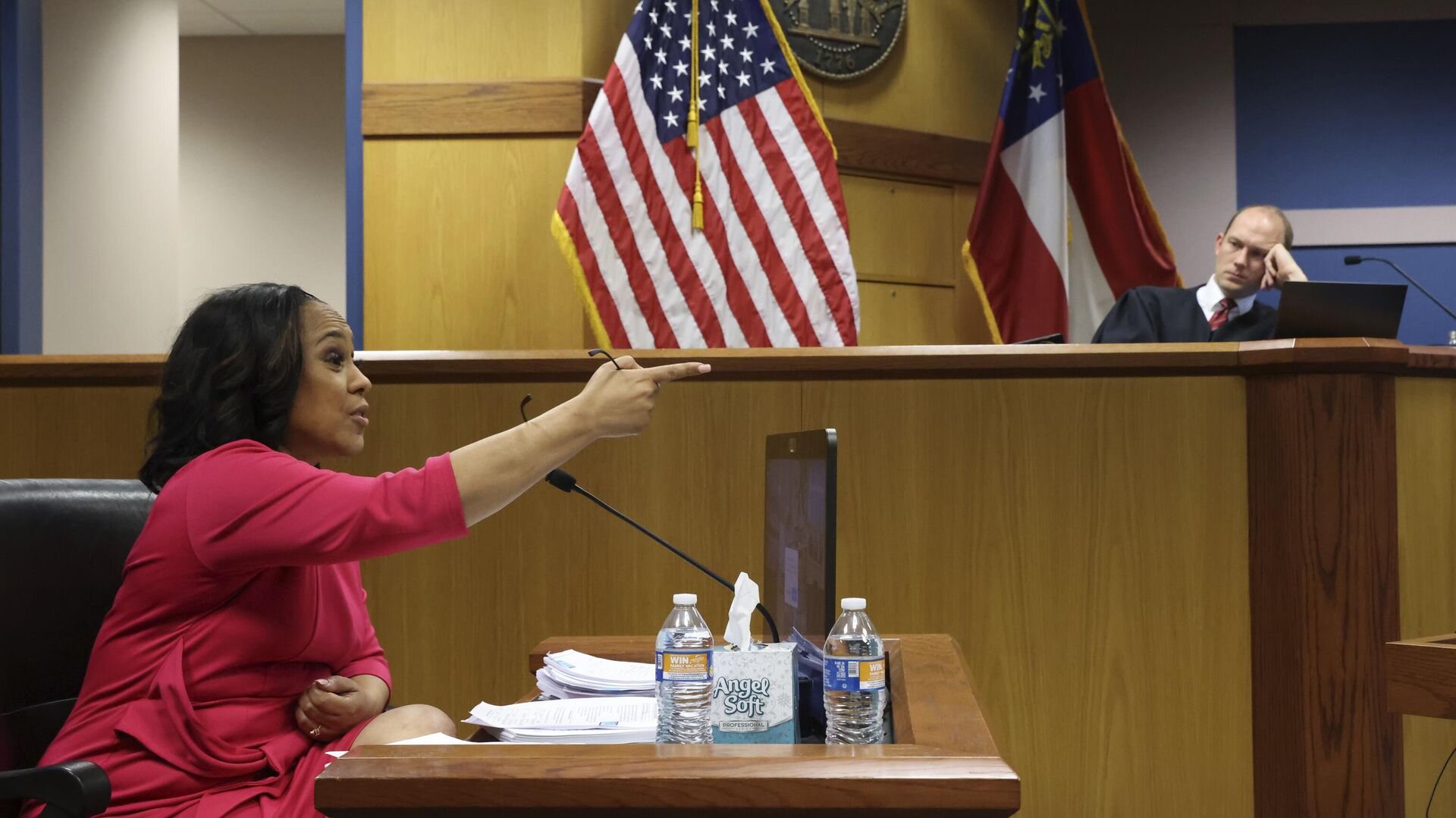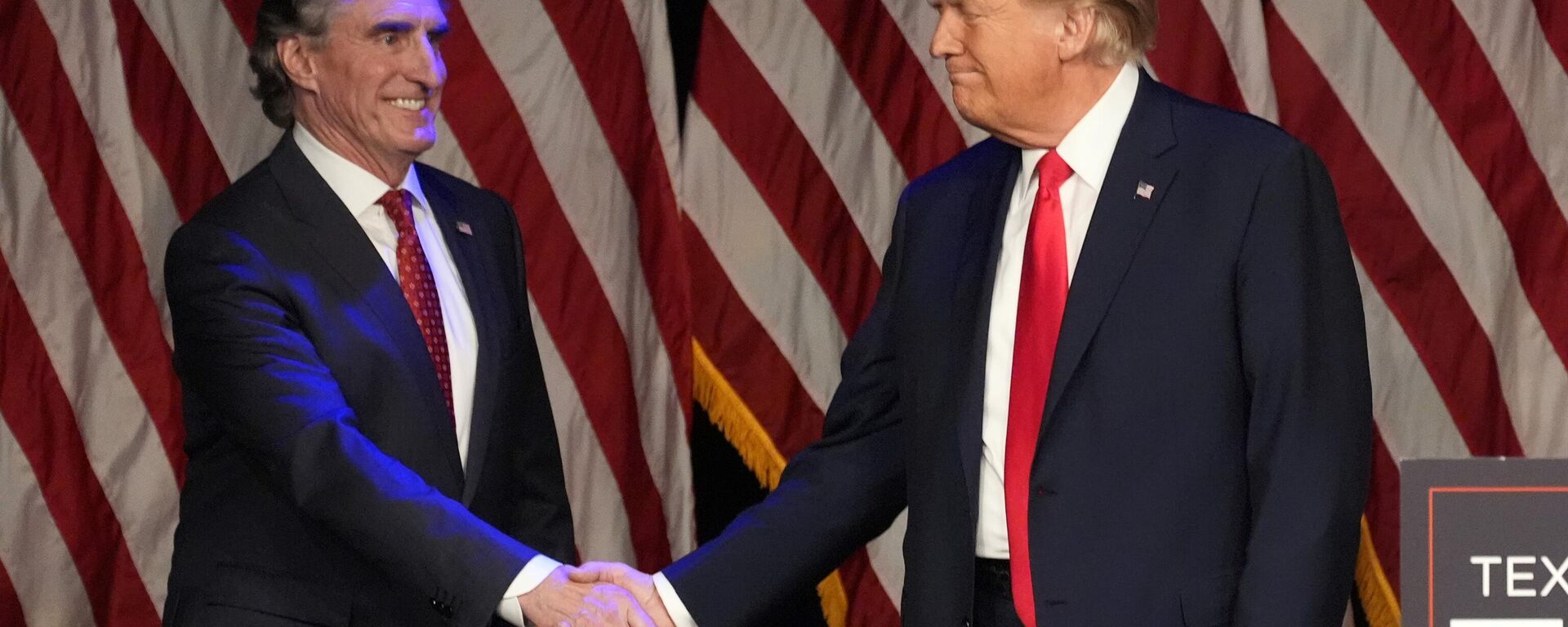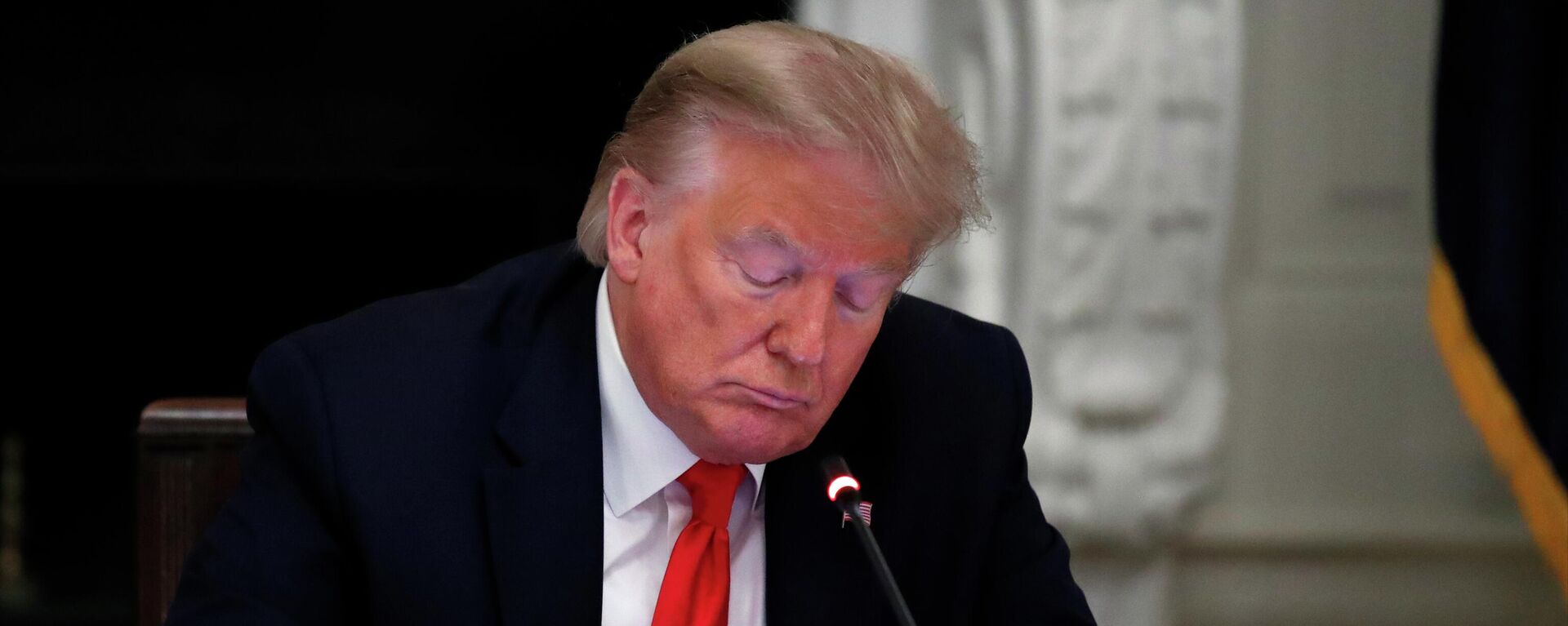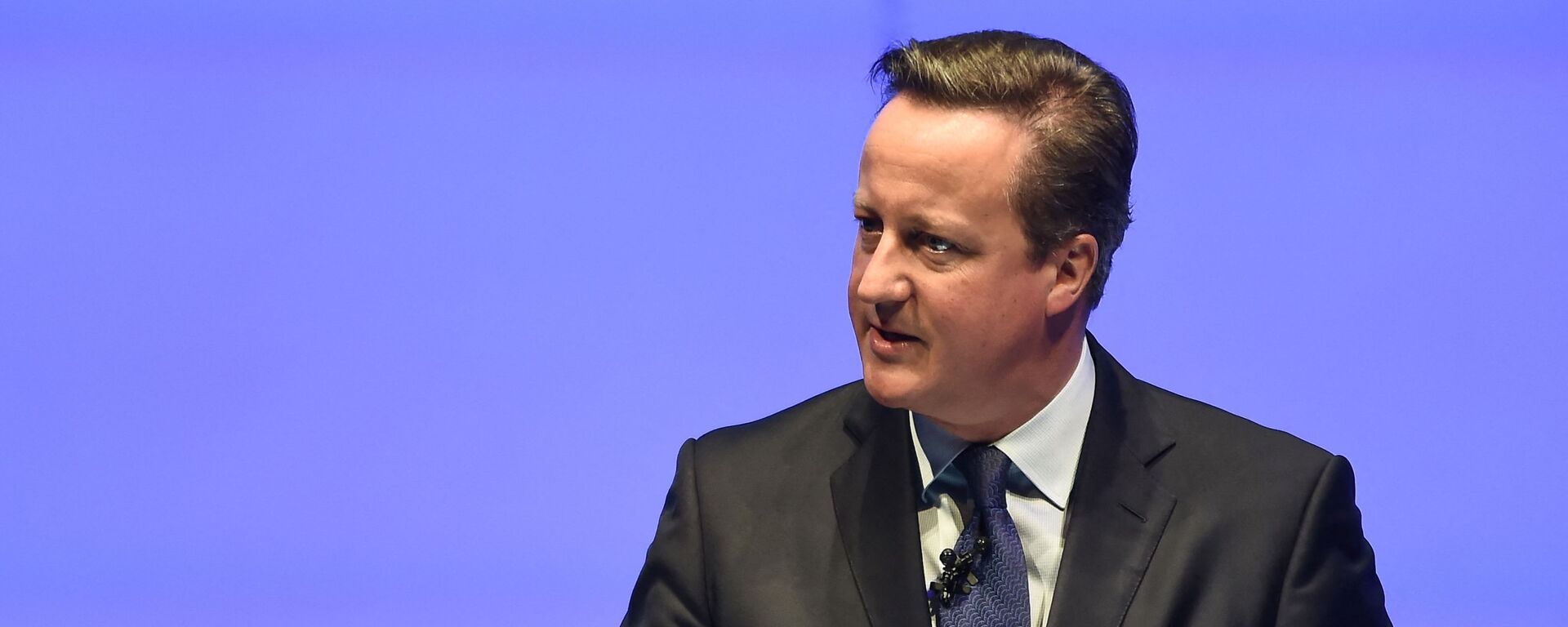https://sputnikglobe.com/20241117/democrat-prosecutors-vow-to-continue-trying-to-jail-trump-allies-as-party-floats-shadow-cabinet-1120911479.html
Democrat Prosecutors Vow to Continue Trying to Jail Trump Allies as Party Floats Shadow Cabinet Idea
Democrat Prosecutors Vow to Continue Trying to Jail Trump Allies as Party Floats Shadow Cabinet Idea
Sputnik International
Republicans defeated Democratic candidates across the spectrum of electoral contests on November 5, winning the presidency, the House and the Senate. Federal and state lawmakers and governors have drawn up ‘resistance’ plans, while strategists debate the pros and cons of fighting Trump “to the death” versus “playing nice.”
2024-11-17T15:36+0000
2024-11-17T15:36+0000
2024-11-17T16:31+0000
americas
donald trump
us
fani willis
georgia
arizona
senate
republicans
democrats
white house
https://cdn1.img.sputnikglobe.com/img/07e8/0b/11/1120912218_0:161:3071:1888_1920x0_80_0_0_9d0f6e8804ea9eeee01bc13f5b52c597.jpg
Democratic prosecutors pursuing Donald Trump in his four federal criminal cases reportedly plan to ease off the pressure on the president-elect, but have vowed to continue fiercely pursuing his surrogates and allies, both at the federal and state levels.Citing the election interference case, Germain pointed to the Supreme Court’s July ruling that former presidents enjoy “absolute” immunity with respect to their “core constitutional powers,” which includes some protection against criminal prosecution, and said he’s confident that the Supreme Court would “uphold a self-pardon” for Trump, although such pardoning power doesn’t extent to state prosecutions.For Trump’s allies, however, among them former chief of staff Mark Meadows, attorney Rudy Giuliani, and other lawyers and aides, the situation is not as rosy, Washington beltway outlet The Hill said in an analysis.Georgia Democrat and District Attorney Fani Willis, pursuing Trump in the Georgia election interference case, has vowed publicly to continue pursuing the president-elect, notwithstanding the election outcome.Willis’s status in the Trump case is precarious and presently being decided by a Georgia appeals court after the discovery of her secret romantic relationship with Nathan Wade, the top special prosecutor in the case, which a judge earlier ruled to be a sign of “impropriety.”Arizona AG Kris Mayes has similarly signaled that her office will not be dropping charges in the “fake electors” prosecution against Trump’s allies.The judge in that case quit after the discovery of a controversial email which defendants said showed “utter contempt” for Trump, signaling intolerable bias.Similar charges are facing Trump surrogates in Michigan, having been previously dismissed or challenged in Nevada, New Mexico and Pennsylvania.Resistance’s New Idea: Shadow CabinetTrump’s imminent return to the White House with GOP majorities in both chambers of Congress has prompted Democrats to brainstorm strategies on what to do over the next 2-4 years, from “resistance” to his agenda at the state level by governors and local legislatures, to fighting his cabinet picks in the Senate by dividing Republicans against one another. Some strategists, pundits and politicians have also called for selective cooperation with the incoming administration, including picking their battles carefully and looking for “common ground when…circumstances dictate.”Another idea – floated by Democratic-leaning media and North Carolina Democratic Congressman Wiley Nickel last week, is setting up a “shadow cabinet” – a British political tradition of appointing ‘shadow ministers’ (or in the US case ‘shadow cabinet heads’ for executive branch departments, like the Departments of Defense or Justice), to marshal the opposition and systematically challenge government decisions.The shadow cabinet system presently exists in Commonwealth countries, and a handful of other nations, including Denmark, Italy, Japan, and occasionally, France (where the practice is uncommon).Nickel has called his idea “democracy’s insurance policy,” and indicated that the 26-member shadow cabinet could be appointed by Democratic House and Senate leaders.“It’s really easy,” the lawmaker assured, floating Senator Adam Schiff as Shadow Attorney General, Representative Adam Smith as Shadow Pentagon chief, Representative Suzan Delbene as Shadow Commerce Secretary, and Representative Rosa Delauro as Shadow Health and Human Service Secretary, to name a few.In the British tradition, shadow cabinets have no executive power. This means that even if the Democrats manage to set up an American version, they will not be able to implement their own agenda.
https://sputnikglobe.com/20241115/trump-picks-north-dakota-governor-for-interior-secretary-1120894058.html
https://sputnikglobe.com/20241115/trump-ignores-traditional-fbi-background-checks-for-some-cabinet-selections---reports-1120899885.html
https://sputnikglobe.com/20240709/david-cameron-to-give-up-role-of-shadow-foreign-secretary-1119304805.html
https://sputnikglobe.com/20241116/what-could-trump-20-mean-for-us-healthcare-1120902478.html
americas
georgia
arizona
Sputnik International
feedback@sputniknews.com
+74956456601
MIA „Rossiya Segodnya“
2024
News
en_EN
Sputnik International
feedback@sputniknews.com
+74956456601
MIA „Rossiya Segodnya“
Sputnik International
feedback@sputniknews.com
+74956456601
MIA „Rossiya Segodnya“
could trump still go to jail, will democrats still try to put trump in prison, can trump be jailed, can trump give himself presidential immunity, will trump have immunity to prosecution
could trump still go to jail, will democrats still try to put trump in prison, can trump be jailed, can trump give himself presidential immunity, will trump have immunity to prosecution
Democrat Prosecutors Vow to Continue Trying to Jail Trump Allies as Party Floats Shadow Cabinet Idea
15:36 GMT 17.11.2024 (Updated: 16:31 GMT 17.11.2024) Republicans defeated Democratic candidates across the spectrum of electoral contests on November 5, winning the presidency, the House and the Senate. Federal and state lawmakers and governors have drawn up ‘resistance’ plans, while strategists debate the pros and cons of fighting Trump “to the death” versus “playing nice.”
Democratic prosecutors pursuing Donald Trump in his four federal criminal cases reportedly plan to ease off the pressure on the president-elect, but have vowed to continue fiercely pursuing his surrogates and allies, both at the federal and state levels.
“In all likelihood, the state criminal cases will be put on hold during Trump’s presidency. If they try to continue with the prosecutions, or even to impose a stayed sentence, I suspect the decisions will be reversed on appeal. It is even possible that the cases will be dismissed,” Syracuse University law professor Gregory Germain
wrote in a post-election analysis of Trump’s legal status.
Citing the election interference case, Germain pointed to the Supreme Court’s July ruling that former presidents enjoy “absolute” immunity with respect to their “core constitutional powers,” which includes some protection against criminal prosecution, and said he’s confident that the Supreme Court would “uphold a self-pardon” for Trump, although such pardoning power doesn’t extent to state prosecutions.
For Trump’s allies, however, among them former chief of staff Mark Meadows, attorney Rudy Giuliani, and other lawyers and aides, the situation is not as rosy, Washington beltway outlet The Hill
said in an analysis.
“In fact, with Trump effectively out of the picture, any limitations the Supreme Court’s presidential immunity decision would have put on the prosecution - barring certain evidence and causing further delays – are now gone,” the outlet said, paraphrasing Georgia State University law professor Michael Kreis.
Georgia Democrat and District Attorney Fani Willis, pursuing Trump in the Georgia election interference case, has vowed publicly to continue pursuing the president-elect, notwithstanding the election outcome.
“If someone has an indictment in this office, no matter who they are, we continue to pursue those charges,” Willis
told local media this week. “I’m here for eight more years, is my plan. So if that’s what it takes for us to get some justice in some cases, we come to work every day, we’ll come to work and look for justice.”
Willis’s status in the Trump case is precarious and presently being decided by a Georgia appeals court after the discovery of her secret romantic relationship with Nathan Wade, the top special prosecutor in the case, which a judge earlier ruled to be a sign of “impropriety.”
Arizona AG Kris Mayes has similarly signaled that her office will not be dropping charges in the “fake electors” prosecution against Trump’s allies.
“I have no intention of dropping that case,” she
said. “We won’t be cowed. We won’t be intimidated. And patriots across the country must stand up for our Constitution, for what is lawful.”
The judge in that case quit after the discovery of a controversial email which defendants said showed “utter contempt” for Trump, signaling intolerable bias.
Similar charges are facing Trump surrogates in Michigan, having been previously dismissed or challenged in Nevada, New Mexico and Pennsylvania.
Resistance’s New Idea: Shadow Cabinet
Trump’s imminent return to the White House with GOP majorities in both chambers of Congress has prompted Democrats to brainstorm strategies on what to do over the next 2-4 years, from
“resistance” to his agenda at the state level by governors and local legislatures, to
fighting his cabinet picks in the Senate by dividing Republicans against one another. Some strategists, pundits and politicians have also called for
selective cooperation with the incoming administration, including picking their battles carefully and looking for “common ground when…circumstances dictate.”
Another idea –
floated by Democratic-leaning media and North Carolina Democratic Congressman Wiley Nickel last week, is setting up a “shadow cabinet” – a British political tradition of appointing ‘shadow ministers’ (or in the US case ‘shadow cabinet heads’ for executive branch departments, like the Departments of Defense or Justice), to marshal the opposition and systematically challenge government decisions.
The shadow cabinet system presently exists in Commonwealth countries, and a handful of other nations, including Denmark, Italy, Japan, and occasionally, France (where the practice is uncommon).
“We need new ideas,” Nickel
said of the initiative. “Democrats have to stop playing defense and start going on offense. It’s not enough to say we’re against Trump and his Project 2025 agenda. We have to say what we’re for, and that’s what’s really behind this idea, to get folks there to counter every cabinet agency, every position that Trump appoints.”
Nickel
has called his idea “democracy’s insurance policy,” and indicated that the 26-member shadow cabinet could be appointed by Democratic House and Senate leaders.
“It’s really easy,” the lawmaker assured, floating Senator Adam Schiff as Shadow Attorney General, Representative Adam Smith as Shadow Pentagon chief, Representative Suzan Delbene as Shadow Commerce Secretary, and Representative Rosa Delauro as Shadow Health and Human Service Secretary, to name a few.
In the British tradition, shadow cabinets have no executive power. This means that even if the Democrats manage to set up an American version, they will not be able to implement their own agenda.








